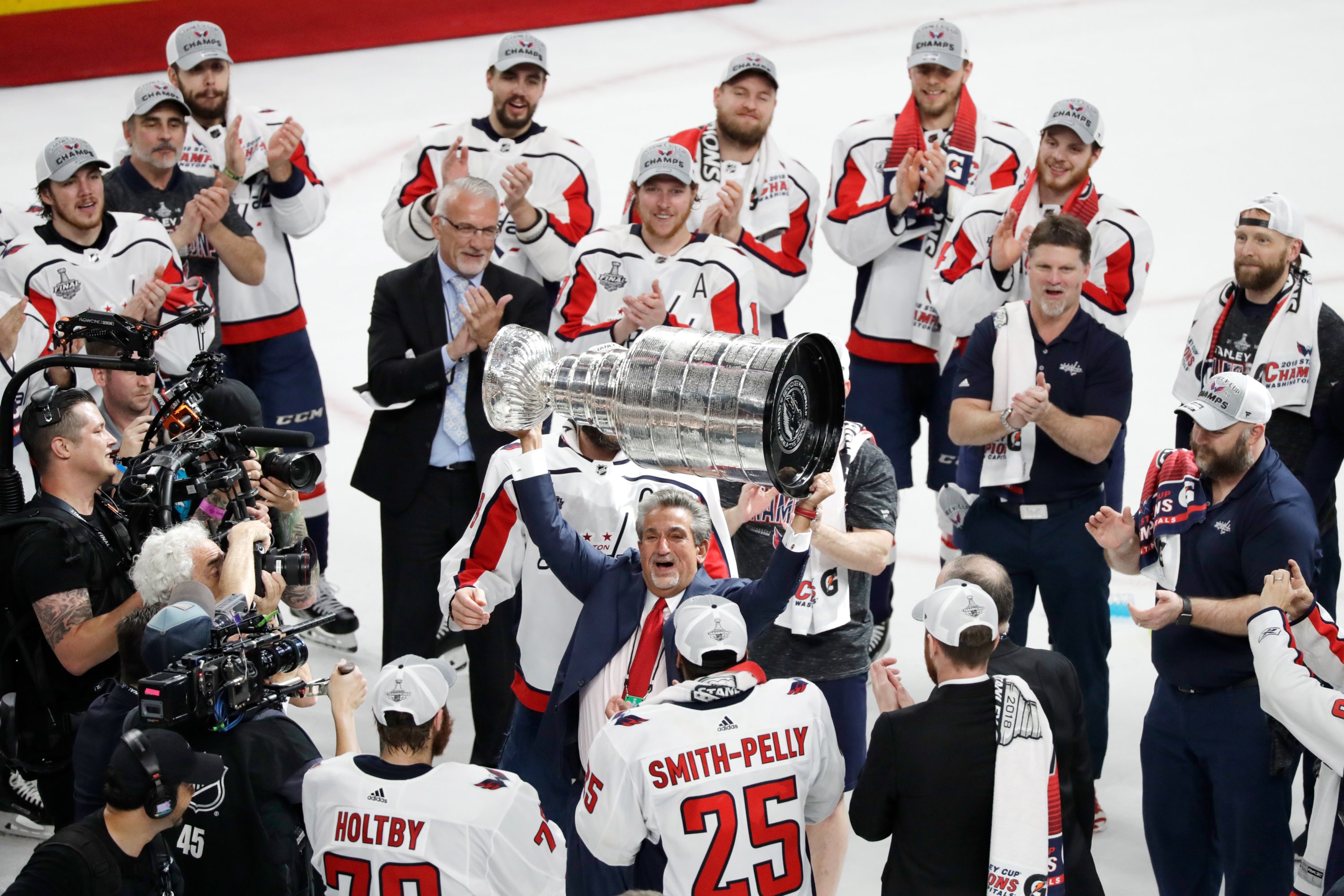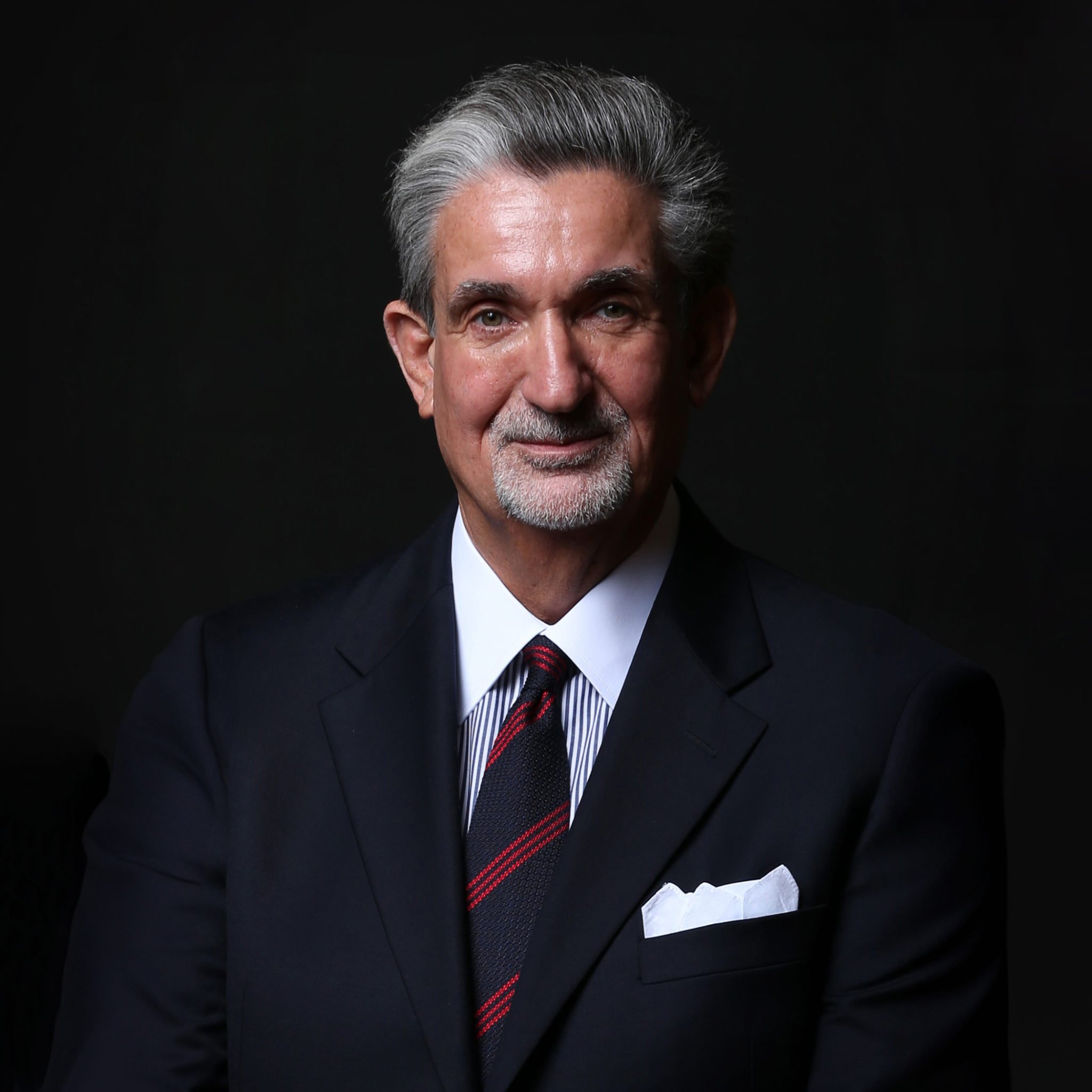The past few months have been rough on Ted Leonsis, the CEO of Monumental Sports & Entertainment. In December, he announced that he planned to move the Capitals and Wizards to a yet-to-be-built arena in Alexandria, ditching their longtime home in downtown DC. The blowback was fierce: Veteran sports commentator Tony Kornheiser accused Leonsis of “villainy.” DC’s attorney general threatened to sue. Even former Wizards star Bradley Beal urged Leonsis to reconsider.
Then, in March, the plan fell apart due to opposition in Virginia’s legislature. In swooped DC mayor Muriel Bowser and the DC Council with a $515 million deal that would provide for improvements at the aging Capital One Arena, as well as commitments to address some of Leonsis’s complaints about crime and noise in the Gallery Place area.
Washingtonian recently met Leonsis in his office at the arena, where his desk is festooned with dozens of bobbleheads and family photos. At the start, he joked that his team had instructed him to “be concise”—something the prolix owner isn’t exactly known for. Then he sat down, wearing a tie emblazoned with the Wizards’ “DC” logo, and proceeded to talk for the next 80 minutes.
You’ve always been the guy who’s on the floor at Wizards games, a cheerleader for DC. How did it feel this year to have a Washington Post columnist liken you to a spoiled child and Virginia politicians portray you as a greedy billionaire with his hand out?
This too shall pass. I think in this real-time world, the pixels fly and then they’re easily forgotten. I never lost sight of what we wanted to accomplish. What I misjudged was that moving three and a half miles away was an act of “I don’t love you, I’m leaving.” That was my misjudgment. It was a tough, emotional 120 days.
We’re sitting in Capital One Arena, where you’re going to be for a while.
The rest of my life.
What’s your relationship like with Mayor Bowser now?
You know, to the mayor’s credit—[when the Virginia deal was announced] people were disappointed. I understand that. People were angry. But the mayor kept at it. And when [the Virginia plan] started to turn the wrong way, she was there. And she worked with us. I think we’ve ended up in a really great place.
To the mayor’s credit, to the city council’s credit, they said, “You have to stay, and if you stay, we’ll rally around. We have to have a great downtown DC.” I mean, we can’t fix anything alone. The police have to be involved, Metro has to be involved, there has to be this integrated plan with businesses and small businesses. And I’m really proud of the teamwork that I’m seeing with the mayor. I feel very confident that we can do it. I feel so confident that next week I’m flying to Las Vegas for a trade show where you recruit businesses and developers to come into your city. I said, “Sign me up. I’ll wear my DC tie.”
One thing that seems relevant to revitalizing downtown is that there are a lot of empty offices. How does that affect plans?
In the hospitality business, we never had a mindset of “you can work remotely.” My position was that if we’re going to bring in people to come to our games and concerts, we can’t not be in the place where the people are going to come. We remain concerned that the federal government has not been able to activate and bring people back into the offices. It is a huge strategic mistake for the federal government and for Washington, DC, to not make people come into work.
I used to see 12 mobile dining trucks outside, and at lunchtime you would see people lined up. They couldn’t get tables because all the restaurants were full. And that’s gone away. I’m sure things will change; someone’s going to say we have to be back in the office and support the local restaurants, go shopping downtown, take the Metro.
In the past, everyone would say Virginia is the best-managed state in the country. It was easier, more efficient, more rational to do business in DC.
And sports facilities have spurred a lot of development in Washington, both in downtown and in Navy Yard with Nationals Park.
I think we were generating, in a couple of square blocks—[Capital One Arena] and the businesses—around $75 million a year in taxes. I drive to Nats games, and I’m amazed that it’s where the young people in the city have gone to live. On a game night, you’ve got people coming from DC, Maryland, and Virginia that go to a game. They take the Metro.
You know, I would read info, when we were thinking of moving to Virginia, that the Metro station was not the right size. It’s the same size for Nats Park!
Arguments like that added up, though. Fairly or not, there was a lot of resistance to the Virginia move.
The lesson that I learned is that in today’s media world and social-media world, when something gets out, it’s hard to catch it. And you’re also advised, “Don’t fight on that. There’s no win. It’s just one little cut.” You die a death of 1,000 cuts.
Still, it was surprising to me that Virginia couldn’t get the deal through.
For the state of Virginia, this was not a good thing. Virginia lost a major business that was approved to go there. For DC and the mayor, it’s a fantastic win. We stayed. And the reason we stayed was that our mayor made DC a better place to work and live than the state of Virginia. If you looked in the past, everyone would say Virginia is the best-managed state in the country. I’m a living testament now to say it was easier, more efficient, more rational to do business in Washington, DC, than it was in Virginia.
Can you create something in DC that compares to what you hoped to do in Virginia?
Yes and no. I think everyone will work with us to be creative, to do things that perhaps they wouldn’t have thought of previously. Can we build higher? Can we change traffic patterns? Can we change the front door? What we don’t have is 70 acres. We want to make playoffs, we want to win championships, so we have to put a fair amount of resources into the player spaces and the training facility. And then what do we do for the employees? When employees don’t feel safe taking the Metro or going out for lunch, that’s not a good thing for recruiting and retaining your talent, right? When we work with the city on safety and lighting and new crime bills, that’s a benefit to our players and our employees as much as it is to our fans.
Then it’s what do we do for our fans? How can we give fans better sightlines, easier ways to get in and out of the building? How do we help to mitigate traffic? How do we enhance their safety? How do we give them more and better bathrooms? I’m starting to look at brochures and magazines on plumbing, right? I never thought I would. But it’s important to fans. The last game of the season for the Wizards, I stayed to the end, obviously, and I’m walking out and there’s a line, at the end of the game, of people going in the bathroom. I was talking to some people, and we need to do things like more stalls.
We’re also very cognizant that the businesses outside are a part of the ambience for our customers. I used to love looking out my window. You’ll note [that now] I have no window. And the reason I have no windows is that the music outside was so loud I had to soundproof my office. And it still didn’t work! I used to be able to look out my window and I would see, at 5 o’clock, thousands of people wearing red Caps jerseys going into all the restaurants and bars.

Well, speaking of Caps jerseys, let’s talk about the teams. It was a better-than-expected year for the Caps.
We did not put into our business plan that the Caps were going to make the playoffs this year. And we made the playoffs! We went from being one of the oldest teams in the league to playing a lot of kids who are 23, 22 years old. The Capitals are in a transition where the core has to change. Alex [Ovechkin] carried us as captain into the playoffs, but he’s older. And so we’re rebuilding the team.
We have an organization that knows how to draft and develop. We had the youngest coach in the NHL, who turned out to be a gem. Then we have Alex Ovechkin, who is historic. I have to manage the great, one-of-a-kind relationship that we have with the best athlete, best performer ever in Washington, DC, in any league.
Do you think he’ll break Wayne Gretzky’s record before he retires?
My expectation is he’s going to break Wayne Gretzky’s record. And when his career ends, that’ll be a touchstone second only to winning the Stanley Cup. But I have to win more cups—we have to win more Stanley Cups.
Okay, how about the Wizards?
With the Wizards, we ended up always close but no cigar. I brought in a new president, new general manager, and gave them the mandate to rebuild the team. They have permission to trade everybody and get young, build an organization and culture that is strategic and isn’t living in the moment. How do we in two years, three years, five years become a great team that’s generational?
The WNBA is having a moment, with Caitlin Clark and other stars attracting tons of interest. How do you plan to meet it?
We are, I think, the longest-tenured or second-longest-tenured WNBA ownership. We worked with the city to what I called right-size, at the time, the arena [the 4,200-seat Entertainment and Sports Arena in Southeast DC, where the Mystics and the Capital City Go-Go play], because the truth of the matter was teams were selling five, six thousand seats for regular-season games. We won the championship the year we moved in the new building. It was sold out, it was loud, it was great. I predicted that something was in the air about women’s sports. You sense that happening in women’s soccer. And then you really saw it happen in NCAA women’s basketball, and the Caitlin effect. We’re able to toggle back and forth—so when we play [Clark and] Indiana, we’ll play it here [at Capital One]—we’ve sold that game out. Women’s sports is going to explode.
All the more reason to put in more bathroom stalls.
This is the greatest time to be a fan, a player, an owner, and to be positive towards the future. And that’s how I want to feel about Washington, DC. You asked, “How do you feel?” I feel great.
This article appears in the June 2024 issue of Washingtonian.



















